 W
WThe history of Egypt under the British lasts from 1882, when it was occupied by British forces during the Anglo-Egyptian War, until 1956, when the last British forces withdrew in accordance with the Anglo-Egyptian agreement of 1954 after the Suez Crisis. The first period of British rule (1882–1914) is often called the "veiled protectorate". During this time the Khedivate of Egypt remained an autonomous province of the Ottoman Empire, and the British occupation had no legal basis but constituted a de facto protectorate over the country. Egypt was thus not part of the British Empire. This state of affairs lasted until 1914 when the Ottoman Empire joined the First World War on the side of the Central Powers and Britain declared a protectorate over Egypt. The ruling khedive was deposed and his successor, Hussein Kamel, compelled to declare himself Sultan of Egypt independent of the Ottomans in December 1914.
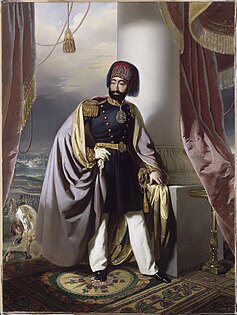 W
WThe 1838 Treaty of Balta Limani, or the Anglo-Ottoman Treaty, is a formal trade agreement signed between the Sublime Porte of the Ottoman Empire and Great Britain. The trade policies imposed upon the Ottoman Empire, after the Treaty of Balta Limani, are considered to be some of the most liberal, open market, settlements that had ever been enacted during the time. The terms of the treaty stated that, the Ottoman Empire will abolish all monopolies, allow British merchants and their collaborators to have full access to all Ottoman markets and will be taxed equally to local merchants. These agreements did not constitute an equal free trade arrangement, as The United Kingdom still employed protectionist policies on their agricultural markets.
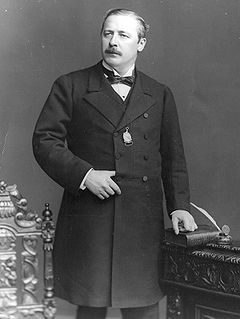 W
WEvelyn Baring, 1st Earl of Cromer, was a British statesman, diplomat and colonial administrator. He served as the British controller-general in Egypt during 1879, part of the international control which oversaw Egyptian finances after the Egyptian bankruptcy of 1876. He later became the agent and consul-general in Egypt from 1883 to 1907 during the British occupation, prompted by the Urabi revolt. This position gave Baring de facto control over Egyptian finances and governance.
 W
WThe Eyalet of Egypt operated as an administrative division of the Ottoman Empire from 1517 to 1867. It originated as a result of the conquest of Mamluk Egypt by the Ottomans in 1517, following the Ottoman–Mamluk War (1516–1517) and the absorption of Syria into the Empire in 1516. The Ottomans administered Egypt as an eyalet of their Empire from 1517 until 1867, with an interruption during the French occupation of 1798 to 1801.
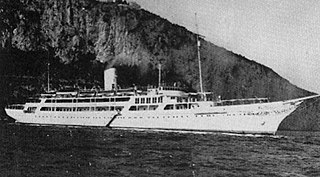 W
WEl Mahrousa, officially renamed for a period of time as El Horreya, is a super yacht that currently serves as Egypt's presidential yacht, and before that as the country's royal yacht. It was built by the British ship building firm Samuda Brothers in 1863 at the order of Khedive Ismail Pasha and the ship was handed over to its Egyptian crew two years later. It is the oldest active super yacht in the world and the ninth largest one.
 W
WEquatoria is a region of southern South Sudan, along the upper reaches of the White Nile. Originally a province of Anglo-Egyptian Condominium, it also contained most of northern parts of present-day Uganda, including Lake Albert and West Nile. It was an idealistic effort to create a model state in the interior of Africa that never consisted of more than a handful of adventurers and soldiers in isolated outposts.
 W
WThe French campaign in Egypt and Syria (1798–1801) was Napoleon Bonaparte's campaign in the Ottoman territories of Egypt and Syria, proclaimed to defend French trade interests, seek further direct alliances with Tipu Sultan, weaken Britain's access to India, and to establish scientific enterprise in the region. It was the primary purpose of the Mediterranean campaign of 1798, a series of naval engagements that included the capture of Malta. The campaign ended in defeat for Napoleon, and the withdrawal of French troops from the region.
 W
WThe history of Egypt under the Muhammad Ali dynasty (1805–1953) spanned the later period of Ottoman Egypt, the Khedivate of Egypt under British patronage, and the nominally independent Sultanate of Egypt and Kingdom of Egypt, ending with the Revolution of 1952 and the formation of the Republic of Egypt.
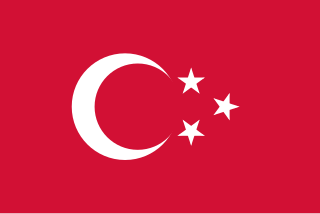 W
WThe Khedivate of Egypt was an autonomous tributary state of the Ottoman Empire, established and ruled by the Muhammad Ali Dynasty following the defeat and expulsion of Napoleon Bonaparte's forces which brought an end to the short-lived French occupation of Lower Egypt. The Khedivate of Egypt had also expanded to control present-day Sudan, South Sudan, Israel, Lebanon, Jordan, Syria, southern Turkey, and northwestern Saudi Arabia.
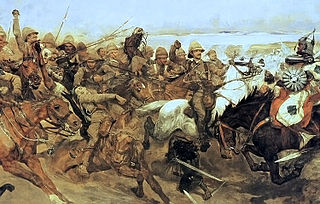 W
WThe Mahdist War was a war of the late 19th century between the Mahdist Sudanese of the religious leader Muhammad Ahmad bin Abd Allah, who had proclaimed himself the "Mahdi" of Islam, and the forces of the Khedivate of Egypt, initially, and later the forces of Britain. Eighteen years of war resulted in the nominally joint-rule state of the Anglo-Egyptian Sudan (1899–1956), a de jure condominium of the British Empire and the Kingdom of Egypt in which Britain had de facto control over the Sudan. The Sudanese launched several unsuccessful invasions of their neighbours, expanding the scale of the conflict to include not only Britain and Egypt but the Italian Empire, the Congo Free State and the Ethiopian Empire.
 W
WAccording to most scholars the history of modern Egypt dates from the start of Muhammad Ali's rule in 1805 and his launching of Egypt's modernization project that involved building a new army and suggesting a new map for the country, though the definition of Egypt's modern history has varied in accordance with different definitions of modernity. Some scholars date it as far back as 1516 with the Ottomans’ defeat of the Mamlūks in 1516–17.
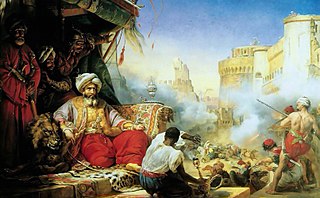 W
WMuhammad Ali's seizure of power in Egypt came following a long, three-way civil war between the Ottoman Turks, Egyptian Mamluks who had ruled Egypt for centuries, and Albanian mercenaries in the service of the Ottomans. The conflict ended in victory for the Albanians led by Muhammad Ali of Egypt (1769–1849).
 W
WThe Oriental Crisis of 1840 was an episode in the Egyptian–Ottoman War in the eastern Mediterranean, triggered by the self-declared Khedive of Egypt and Sudan Muhammad Ali Pasha's aims to establish a personal empire in the Ottoman province of Egypt.